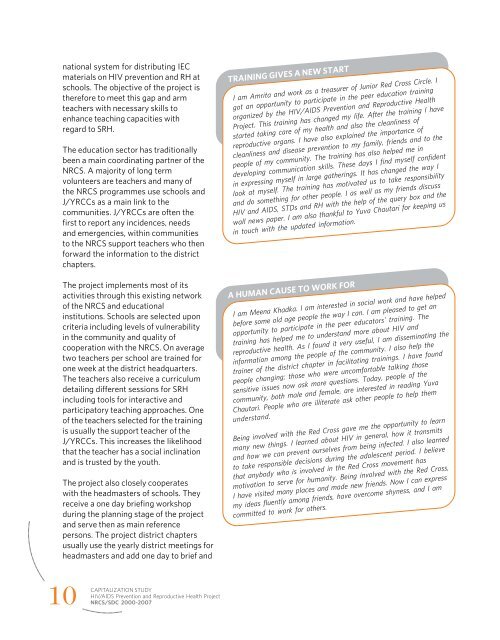HIV/AIDS Prevention & Reproductive Health Project
HIV/AIDS Prevention & Reproductive Health Project
HIV/AIDS Prevention & Reproductive Health Project
Create successful ePaper yourself
Turn your PDF publications into a flip-book with our unique Google optimized e-Paper software.
national system for distributing IEC<br />
materials on <strong>HIV</strong> prevention and RH at<br />
schools. The objective of the project is<br />
therefore to meet this gap and arm<br />
teachers with necessary skills to<br />
enhance teaching capacities with<br />
regard to SRH.<br />
The education sector has traditionally<br />
been a main coordinating partner of the<br />
NRCS. A majority of long term<br />
volunteers are teachers and many of<br />
the NRCS programmes use schools and<br />
J/YRCCs as a main link to the<br />
communities. J/YRCCs are often the<br />
first to report any incidences, needs<br />
and emergencies, within communities<br />
to the NRCS support teachers who then<br />
forward the information to the district<br />
chapters.<br />
The project implements most of its<br />
activities through this existing network<br />
of the NRCS and educational<br />
institutions. Schools are selected upon<br />
criteria including levels of vulnerability<br />
in the community and quality of<br />
cooperation with the NRCS. On average<br />
two teachers per school are trained for<br />
one week at the district headquarters.<br />
The teachers also receive a curriculum<br />
detailing different sessions for SRH<br />
including tools for interactive and<br />
participatory teaching approaches. One<br />
of the teachers selected for the training<br />
is usually the support teacher of the<br />
J/YRCCs. This increases the likelihood<br />
that the teacher has a social inclination<br />
and is trusted by the youth.<br />
The project also closely cooperates<br />
with the headmasters of schools. They<br />
receive a one day briefing workshop<br />
during the planning stage of the project<br />
and serve then as main reference<br />
persons. The project district chapters<br />
usually use the yearly district meetings for<br />
headmasters and add one day to brief and<br />
TRAINING GIVES A NEW START<br />
I am Amrita and work as a treasurer of Junior Red Cross Circle. I<br />
got an opportunity to participate in the peer education training<br />
organized by the <strong>HIV</strong>/<strong>AIDS</strong> <strong>Prevention</strong> and <strong>Reproductive</strong> <strong>Health</strong><br />
<strong>Project</strong>. This training has changed my life. After the training I have<br />
started taking care of my health and also the cleanliness of<br />
reproductive organs. I have also explained the importance of<br />
cleanliness and disease prevention to my family, friends and to the<br />
people of my community. The training has also helped me in<br />
developing communication skills. These days I find myself confident<br />
in expressing myself in large gatherings. It has changed the way I<br />
look at myself. The training has motivated us to take responsibility<br />
and do something for other people. I as well as my friends discuss<br />
<strong>HIV</strong> and <strong>AIDS</strong>, STDs and RH with the help of the query box and the<br />
wall news paper. I am also thankful to Yuva Chautari for keeping us<br />
in touch with the updated information.<br />
A HUMAN CAUSE TO WORK FOR<br />
I am Meena Khadka. I am interested in social work and have helped<br />
before some old age people the way I can. I am pleased to get an<br />
opportunity to participate in the peer educators’ training. The<br />
training has helped me to understand more about <strong>HIV</strong> and<br />
reproductive health. As I found it very useful, I am disseminating the<br />
information among the people of the community. I also help the<br />
trainer of the district chapter in facilitating trainings. I have found<br />
people changing; those who were uncomfortable talking those<br />
sensitive issues now ask more questions. Today, people of the<br />
community, both male and female, are interested in reading Yuva<br />
Chautari. People who are illiterate ask other people to help them<br />
understand.<br />
Being involved with the Red Cross gave me the opportunity to learn<br />
many new things. I learned about <strong>HIV</strong> in general, how it transmits<br />
and how we can prevent ourselves from being infected. I also learned<br />
to take responsible decisions during the adolescent period. I believe<br />
that anybody who is involved in the Red Cross movement has<br />
motivation to serve for humanity. Being involved with the Red Cross,<br />
I have visited many places and made new friends. Now I can express<br />
my ideas fluently among friends, have overcome shyness, and I am<br />
committed to work for others.<br />
10<br />
CAPITALIZATION STUDY<br />
<strong>HIV</strong>/<strong>AIDS</strong> <strong>Prevention</strong> and <strong>Reproductive</strong> <strong>Health</strong> <strong>Project</strong><br />
NRCS/SDC 2000-2007

















